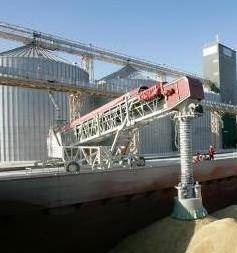Russia secretly enters quotas on grain exports

At the meeting with the Ministry of agriculture of the Russian exporters announced the introduction of the unspoken quotas on the export of grain, which were distributed according to historical principle, on the basis of export performance as of October 2018
According to the forecast of the Ministry of agriculture in 2018/19 mg of exports 42 million tonnes of grain, which is 20% inferior to 52.4 million tonnes in 2017/18 MG. In 2018, Russia harvested 112,9 million tons of grain, which is 17% below the record crop of 2017 135.5 million tonnes.
During July-December 2018 Russia exported 29 million tonnes of grain, despite the forecast of MSG to 28 million tons, therefore, to reduce the rate of export of the Ministry has intensified the screening of export shipments. For the issue of phytosanitary documents now goes 1-2 days and 2-3 weeks. Thus the freight of a vessel with a displacement of 25 thousand tons costs $ 10 thousand daily, and with a displacement of 50 thousand tons and 15 thousand $, which increases costs by $4/t. in addition, in the course of the year the ports are required to report weekly volumes of shipped grain.
the Ministry of agriculture explains the strengthening of checks received from Vietnam, Indonesia and some African countries with claims concerning the quality of grain and not associate it with an artificial export restrictions.
Since February, export prices of wheat increased by 4% to 250 $/t, but then began to decline, because there is increased competition of Russian wheat, French, American, Australian and Argentinean grain.
In January it exported 3 million tonnes of grain, which is 5% inferior to last year's figure, however, in February, when it was sold for 2.4 million tons, the gap has grown to 40%. Grain export is one third of foreign exchange earnings of the country in 2024, it will increase 1.5 times and will amount to 11.4 billion $.
Traders believe that the state should openly communicate about restricting exports, as has been done in February 2015, when it was introduced the appropriate fee. In September 2016, the customs rate resets, however, the duty is not abolished.
However, the opaque rules of the game reinforce the risks of corruption that most of the world's grain traders believe is invalid.


